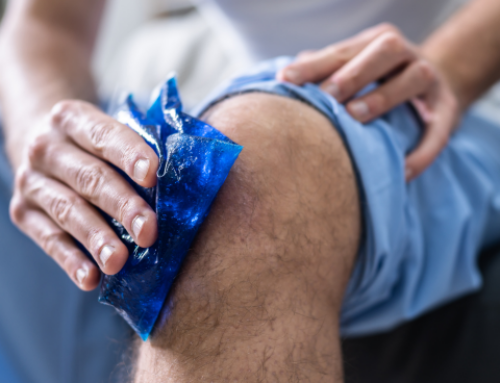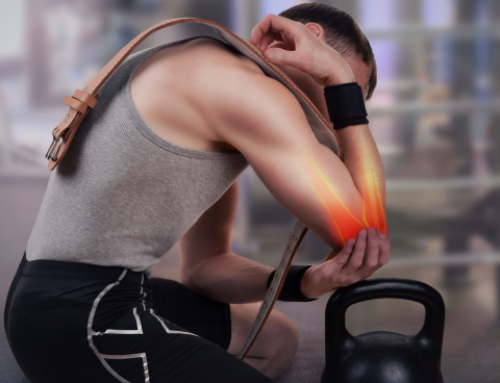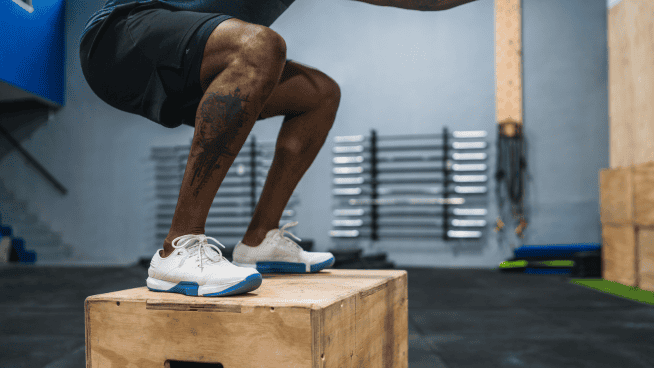Natural Remedies for a Pulled Muscle to Keep You in the Game
Pulled your hamstring sidestepping a linebacker? Pulled a back muscle during that first Deadlift set because you were in a hurry and didn’t warm up?
A “pull” is actually slang for a strained muscle. Not only does the muscle hurt when you move, but its range of motion is minimized, prompting a visit to the athletic trainer’s office for treatment.
Generally, the first and most natural therapy health professionals recommend for strains and sprains is ice.
Placing an ice pack on the injured muscle or tendon for 10 to 20 minutes at least four times in the first 24 to 48 hours not only reduces swelling and pain but can speed up the healing process.
Delaying ice treatment can prolong recovery and cause scar tissue to form around the injury, restricting full range of motion of the joint or muscle.
Besides icing, here are more natural remedies you can try at home to facilitate pulled muscle recovery and get back on the field or in the weight room sooner rather than later.
Pulled Muscle Remedies
Ginger
Powdered ginger contains a natural aspirin-like, anti-inflammatory substance called zingibain.
Mix a teaspoon of powdered ginger with a teaspoon of olive oil. Gently apply the ointment over a pulled hamstring or an achy shoulder to help eliminate swelling, tenderness and stiffness. Olive oil has anti-inflammatory properties through its omega-3 fatty acid compounds and oleocanthol.
Apply this salve four to five times throughout the day. In addition to the external benefits, you can get the pain-relieving effects of ginger by adding it to salads or mixing it in hot water to make a tea. According to a study in the September 2010 issue of The Journal of Pain, consuming just 2 grams of ginger daily alleviated 25 percent of pain from exercise-induced muscle injury.
Pineapple
Whether you eat juicy pineapple chunks or topically apply the fruit directly on the pulled muscle, the natural anti-inflammatory enzyme bromelain in pineapple soothes soreness around the injured tissue. According to researchers at the University of Maryland Medical Center, it reduces inflammation from tendonitis, sprains, strains, and other minor muscle injuries.
Onions
Raw onions, which contain anti-inflammatory sulfur compounds and the anti-inflammatory antioxidant quercetin, have been used for centuries to increase blood circulation, reduce pain-causing toxins around injuries and relax muscles.
Eat diced or sliced raw onions in salads or over vegetables, or topically apply a sliced raw onion over an inflamed area to get relief and enhance healing.
Cayenne Pepper
Hot chili peppers and cayenne pepper powder contain the natural anti-inflammatory compound capsaicin for alleviating minor pain from sprains and strains, according to the Mayo Clinic website.
Mix half a teaspoon of cayenne powder with half a teaspoon of olive oil and apply it over the sore muscle. Sprinkle crushed red pepper flakes over meat or pasta, or put diced hot pepper in salads or atop vegetables for additional anti-inflammatory properties that aid recovery and get you back in the lineup.
Mustard and Curry
Hot spicy mustard, plain mustard and curry contain the potent anti-inflammatory spice turmeric—effective for soothing painful strained muscles, sprains and achy joints from sports and exercise, according to Dr. Minerva Santos, Director of Integrated Medicine at New York’s Northern Westchester Hospital.
For external use, mix either a teaspoon of mustard or turmeric powder with half a teaspoon of olive oil and apply to sore muscles and joints a few times daily. Double the anti-inflammatory properties of turmeric by adding the powder to brown rice. Add spicy mustard to hard-boiled eggs to ease post-exercise muscle soreness and boost recovery from a pulled muscle.
In addition to these natural remedies, you can also apply moist heat with Epsom salts after the swelling has gone down. Dip a towel into a cup of Epsom salts mixed with warm water and apply to the sore area to ease discomfort and encourage healing.
Once the pain and swelling are gone, you can gradually attempt full-range movement and perform gentle static stretches to improve flexibility around the muscle and joint.
Read more:
- Get Back in the Game After Pulling a Muscle
- Healing a Pre-Season Muscle Strain
- Preventing and Treating Common Muscle Strains
References:
- Baker, Jerry. Amazing Antidotes (2007, American Master Products, Inc., Wixom, MI). p. 391.
- Editors of FC&A Medical Publishing. Anti-Aging Super Foods (2011, FC&A Medical Publishing, Peachtree City, GA). p. 132.
- Journal of Pain. September 2010 (Vol. 11, Issue 9, pp. 894-903). “Ginger Reduces Muscle Pain Caused by Eccentric Exercise.”
- University of Maryland Medical Center website. “Overview: Bromelain: Surgery, Sprains and Strains, and Tendinitis.” April 3, 2011.
- Shealy, C. Norman, MD, PhD. The Illustrated Encyclopedia of Healing Remedies (2002, HarperCollins, London). p. 82.
- Mayoclinic.com. “Capsaicin (Topical Route).” November 1, 2011.
- The New York Times. “The Doctor’s Remedy: Turmeric for Joint Pain.” October 19, 2011.
RECOMMENDED FOR YOU
MOST POPULAR
Natural Remedies for a Pulled Muscle to Keep You in the Game
Pulled your hamstring sidestepping a linebacker? Pulled a back muscle during that first Deadlift set because you were in a hurry and didn’t warm up?
A “pull” is actually slang for a strained muscle. Not only does the muscle hurt when you move, but its range of motion is minimized, prompting a visit to the athletic trainer’s office for treatment.
Generally, the first and most natural therapy health professionals recommend for strains and sprains is ice.
Placing an ice pack on the injured muscle or tendon for 10 to 20 minutes at least four times in the first 24 to 48 hours not only reduces swelling and pain but can speed up the healing process.
Delaying ice treatment can prolong recovery and cause scar tissue to form around the injury, restricting full range of motion of the joint or muscle.
Besides icing, here are more natural remedies you can try at home to facilitate pulled muscle recovery and get back on the field or in the weight room sooner rather than later.
Pulled Muscle Remedies
Ginger
Powdered ginger contains a natural aspirin-like, anti-inflammatory substance called zingibain.
Mix a teaspoon of powdered ginger with a teaspoon of olive oil. Gently apply the ointment over a pulled hamstring or an achy shoulder to help eliminate swelling, tenderness and stiffness. Olive oil has anti-inflammatory properties through its omega-3 fatty acid compounds and oleocanthol.
Apply this salve four to five times throughout the day. In addition to the external benefits, you can get the pain-relieving effects of ginger by adding it to salads or mixing it in hot water to make a tea. According to a study in the September 2010 issue of The Journal of Pain, consuming just 2 grams of ginger daily alleviated 25 percent of pain from exercise-induced muscle injury.
Pineapple
Whether you eat juicy pineapple chunks or topically apply the fruit directly on the pulled muscle, the natural anti-inflammatory enzyme bromelain in pineapple soothes soreness around the injured tissue. According to researchers at the University of Maryland Medical Center, it reduces inflammation from tendonitis, sprains, strains, and other minor muscle injuries.
Onions
Raw onions, which contain anti-inflammatory sulfur compounds and the anti-inflammatory antioxidant quercetin, have been used for centuries to increase blood circulation, reduce pain-causing toxins around injuries and relax muscles.
Eat diced or sliced raw onions in salads or over vegetables, or topically apply a sliced raw onion over an inflamed area to get relief and enhance healing.
Cayenne Pepper
Hot chili peppers and cayenne pepper powder contain the natural anti-inflammatory compound capsaicin for alleviating minor pain from sprains and strains, according to the Mayo Clinic website.
Mix half a teaspoon of cayenne powder with half a teaspoon of olive oil and apply it over the sore muscle. Sprinkle crushed red pepper flakes over meat or pasta, or put diced hot pepper in salads or atop vegetables for additional anti-inflammatory properties that aid recovery and get you back in the lineup.
Mustard and Curry
Hot spicy mustard, plain mustard and curry contain the potent anti-inflammatory spice turmeric—effective for soothing painful strained muscles, sprains and achy joints from sports and exercise, according to Dr. Minerva Santos, Director of Integrated Medicine at New York’s Northern Westchester Hospital.
For external use, mix either a teaspoon of mustard or turmeric powder with half a teaspoon of olive oil and apply to sore muscles and joints a few times daily. Double the anti-inflammatory properties of turmeric by adding the powder to brown rice. Add spicy mustard to hard-boiled eggs to ease post-exercise muscle soreness and boost recovery from a pulled muscle.
In addition to these natural remedies, you can also apply moist heat with Epsom salts after the swelling has gone down. Dip a towel into a cup of Epsom salts mixed with warm water and apply to the sore area to ease discomfort and encourage healing.
Once the pain and swelling are gone, you can gradually attempt full-range movement and perform gentle static stretches to improve flexibility around the muscle and joint.
Read more:
- Get Back in the Game After Pulling a Muscle
- Healing a Pre-Season Muscle Strain
- Preventing and Treating Common Muscle Strains
References:
- Baker, Jerry. Amazing Antidotes (2007, American Master Products, Inc., Wixom, MI). p. 391.
- Editors of FC&A Medical Publishing. Anti-Aging Super Foods (2011, FC&A Medical Publishing, Peachtree City, GA). p. 132.
- Journal of Pain. September 2010 (Vol. 11, Issue 9, pp. 894-903). “Ginger Reduces Muscle Pain Caused by Eccentric Exercise.”
- University of Maryland Medical Center website. “Overview: Bromelain: Surgery, Sprains and Strains, and Tendinitis.” April 3, 2011.
- Shealy, C. Norman, MD, PhD. The Illustrated Encyclopedia of Healing Remedies (2002, HarperCollins, London). p. 82.
- Mayoclinic.com. “Capsaicin (Topical Route).” November 1, 2011.
- The New York Times. “The Doctor’s Remedy: Turmeric for Joint Pain.” October 19, 2011.











